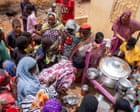
In an interconnected world, recent events reflect a tapestry of significant challenges and transformations. From the plight of those living in conflict-affected regions to ongoing socio-political changes in various parts of the globe, the need for thoughtful solutions is clear.
In many regions affected by conflict, the specter of poverty looms large. According to a recent assessment by the World Bank, poverty is increasing at an accelerated rate in 39 countries that are grappling with wars and internal conflicts. This rise has unfortunately left more than a billion people facing hunger. The affected regions, predominantly in Africa, have seen setbacks in economic growth, substantially reducing the incomes of those who reside there. As a call to action, the World Bank has urged other nations to enhance their support, highlighting the shared responsibility of the global community in addressing these humanitarian challenges.
Meanwhile, in Kenya, a country that has experienced its own series of protests, recent demonstrations have led to significant unrest. These protests, which aimed to honor those who lost their lives in anti-government demonstrations the previous year, escalated into violence resulting in the tragic loss of 16 lives and injuries to 400 individuals. Amnesty International Kenya’s Executive Director, Irũngũ Houghton, confirmed that most casualties were due to police actions. These developments underscore the delicate balance between the right to protest and the need for peace and security, a challenge that many nations face.
Across the Atlantic, the academic landscape in the United States is also witnessing turbulence. At the University of Virginia, President James Ryan announced his resignation under pressure from political forces. This decision came amidst a Justice Department inquiry into the university’s diversity, equity, and inclusion (DEI) policies during the Trump administration. The resignation highlights the complex interplay between political influence and educational policy, reflecting broader national debates about the role of DEI initiatives in academic institutions.
Tackling these multifaceted issues requires a concerted effort from governments, communities, and international organizations. While the challenges are significant, there is hope in collective action and shared commitment. Efforts to alleviate poverty in conflict zones must be intensified, ensuring that economic opportunities and humanitarian aid reach those most in need. In nations like Kenya, fostering dialogue between citizens and government can pave the way for peaceful and constructive solutions to grievances. Additionally, educational institutions continue to serve as crucial arenas for dialogue and progress, navigating political currents while maintaining their mission of inclusive excellence.
In reflecting on these global events, it becomes apparent that they all underline the importance of empathy, understanding, and collaboration in addressing the complex issues facing humanity. As the world turns to face these challenges, the strength in solidarity and the promise of progress shine bright.
Source: {link}
